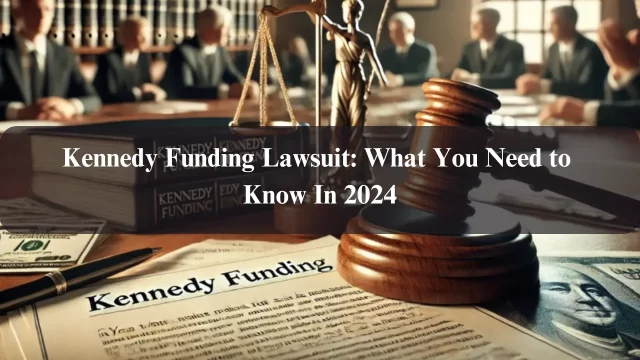The world of finance is often shrouded in complexity, and when it comes to major players like Kennedy Funding, intrigue can quickly turn into controversy. Recently, the spotlight has turned to a lawsuit that could have far-reaching implications for borrowers and investors. As details unfold, many are left wondering: what does this mean for those involved? In this blog post, we’ll explain everything you need to know about the Kennedy Funding lawsuit—from its background to its potential impacts on stakeholders. Stay tuned as we navigate through this increasingly prominent legal battle.
Table of Contents
What is Kennedy Funding?
Kennedy Funding is a prominent private money lender based in the United States. It specialises in real estate financing and provides loans to developers and investors needing help with conventional funding options.
Founded by industry veterans, Kennedy Funding has carved out a niche by offering quick turnaround times and tailored financial solutions. The company typically focuses on commercial properties, including multifamily developments and industrial projects.
With a flexible commitment, Kennedy Funding often works with clients facing unique challenges. This approach allows them to address urgent financing needs that traditional banks might overlook. Their experience spans various markets and economic conditions, which adds depth to their lending strategies.
While the firm has enjoyed significant success over the years, recent legal troubles have put its practices under scrutiny. Stakeholders are now watching closely as events surrounding these allegations unfold.
Overview of the Lawsuit
The Kennedy Funding lawsuit has captured significant attention in the financial and legal communities. This case revolves around allegations that raise serious questions about the company’s business practices.
At its core, the lawsuit involves claims of misrepresentation and breach of contract. Plaintiffs argue that they were misled regarding loan agreements, significantly impacting their investments and financial decisions.
Documents filed in court detail a timeline of events leading up to this dispute. The complexity of these claims indicates potential ramifications for both sides involved.
As proceedings unfold, many closely monitor how this will affect Kennedy Funding’s reputation and future operations. Investors are particularly anxious about what outcomes may mean for their existing commitments with the company.
Background of the Dispute
The dispute surrounding Kennedy Funding traces back to several high-stakes real estate deals. As a prominent private lender, Kennedy Funding has engaged in numerous transactions nationwide. These ventures often involve large sums and complex agreements.
Tensions began to rise when some borrowers expressed dissatisfaction with their loan terms. Allegations of miscommunication and insufficient transparency emerged. Dissatisfied clients felt that they needed to be adequately informed about the implications of their loans.
This friction escalated into legal challenges as frustrated parties sought recourse through litigation. Given the significant financial commitment of all parties concerned, the stakes were high. With each side presenting its perspective, tensions mounted further within the competitive lending landscape.
As more details surfaced, public scrutiny intensified around Kennedy Funding’s practices and policies, setting the stage for a contentious legal battle.
Allegations Against Kennedy Funding
Kennedy Funding faces serious allegations that have raised eyebrows in the financial community. Critics claim the company engaged in misleading practices regarding loan terms and conditions. Borrowers allege they needed to be fully informed about fees, interest rates, and potential penalties.
Additionally, some investors have voiced concerns over transparency. They argue that crucial information should have been heard during investment processes, leading to distrust among stakeholders.
The situation escalated when several parties filed lawsuits against Kennedy Funding. These legal challenges highlight broader issues within the lending industry, particularly concerning ethical practices. As details emerge, many are eager to see how these claims will unfold in court and impact the company’s future operations.
Response from Kennedy Funding
Kennedy Funding has publicly addressed the allegations stemming from the lawsuit. The company maintains that its practices are transparent and compliant with industry standards. It asserts that its lending processes are fair and aim to support borrowers in achieving their financial goals.
In response to the claims, Kennedy Funding emphasises that it has documentation to back its transactions. It argues that this evidence will demonstrate a commitment to ethical business practices.
Additionally, Kennedy Funding highlights its long history in the financing sector. The firm believes this experience underscores its reliability as a lender. Their representatives express confidence in clearing up misunderstandings surrounding the dispute.
The company communicates with affected parties throughout the legal process—thialleviateste concerns while reinforcing trust among existing clients and potential investors.
Impact on Borrowers and Investors
The Kennedy Funding lawsuit has raised concerns among borrowers and investors alike. For borrowers, uncertainty looms regarding the terms of their existing loans. Some fear ongoing legal troubles could lead to stricter lending conditions or even loan cancellations.
Investors are equally anxious about the ramifications of this case. As the lawsuit unfolds, the potential for financial losses becomes more pronounced. Trust in Kennedy Funding may be shaken, causing investors to reconsider future engagements.
Furthermore, market sentiment can shift quickly during such disputes. This ripple effect might also affect other firms within the industry, potentially leading to a tighter credit environment overall.
Communication from Kennedy Funding is crucial at this juncture. Transparency can alleviate some concerns and restore confidence among stakeholders on both sides of the equation. But until clear resolutions emerge, anxiety will likely persist for all involved parties.
Understanding the Legal Process
Navigating the legal process can be complex, especially in cases like the Kennedy Funding lawsuit. It begins with filing a complaint outlining the allegations against the company.
After this initial step, both parties engage in discovery. This phase involves gathering evidence and information relevant to the case. Documents are exchanged, and depositions may occur.
Next comes pre-trial motions, in which lawyers argue over what evidence should be allowed in court. This stage often sets the tone for trial proceedings.
If a settlement isn’t reached beforehand, a trial will take place. Each side presents its arguments and evidence before a judge or jury during this time.
Post-trial options include appeals if one party believes there was an error during litigation. Understanding these phases helps borrowers and investors anticipate how situations might unfold as they follow developments related to the Kennedy Funding Lawsuit.
Conclusion
The Kennedy Funding lawsuit has captured significant attention from the parties involved, as well as its potential impact on the finance and investment landscape. As both borrowers and investors navigate this complex situation, staying informed about ongoing developments is essential.
Understanding the intricacies of legal disputes is crucial in times like these. The outcome could set a precedent that affects how financial institutions operate. Keeping an eye on updates will be beneficial as they unfold.
As we watch this case progress, one thing remains clear: knowledge is power. Being equipped with information enables stakeholders to make better decisions during uncertain times.







